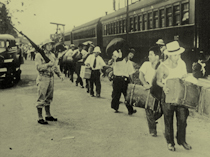

Panama Canal Zone: Japanese Peruvians en route to U.S. Internment Camps. April 2, 1942. U.S. Army Signal Corps Photo. National Archives. Courtesy of National Japanese American Historical Society.
CFJ Brochure – English,
Japanese, Spanish
Bibliography
FAQ
Commission Bill
Books
Videos
Photo Gallery
Exhibits
Speeches
Archives
Litigation Archives
Newsletters
Past Events
| Join Our Mailing List |
Campaign for Justice
P.O. Box 1384
El Cerrito, CA 94530
(510) 528-7288
info@campaignforjusticejla.org
|
Delegation to Deliver Report to U.S. Congress Click here for a pdf version of this press release. Click here to view the invitation to the reception. A newly published report, HERE IN AMERICA? Immigrants as “The Enemy” During WWII and Today, was presented to the U.S. Congress in May by representatives of the Assembly on Wartime Relocation and Internment of Civilians (AWRIC). The report documents a public event held last year and provides background information about the WWII Enemy Alien Program and its relevance for all Americans today. The Assembly featured testimonies of Japanese, German, Italian and Latin American families affected by World War II policies and of Arab, Muslim and South Asian Americans caught up in the “war on terror” since 9/11. It was an emotional, powerful two days of stories, some told publicly for the first time. Though separated by sixty years, the stories shared many similar elements: immigrants arrested and detained withoutcharges, trials or access to attorneys, interned for years or deported into war zones. A delegation of nine AWRIC participants and supporters delivered the report to Congress in Washington, DC, during the week of May 15, 2006. The delegates met with Congress members to urge them to use this important historical information when considering current and future legislation that would fund fact-finding investigations and public education about the WWII period. Delegates were Grace Shimizu, Director of the Japanese Peruvian Oral History Project (JPOHP); Karen Ebel, daughter of a German internee; film-maker Judith Ehrlich-Bertoni; former Japanese Peruvian internees Art Shibayama, Libia Yamamoto and Blanca Katsura; graphic designer Noreen Rei Fukumori, former Japanese American internee Ruth Ichinaga; and Samina Faheem Sundas, Executive Director of American Muslim Voice. The delegates also met with and gave the report to the Inter-American Commission on Human Rights, a body of the Organization of American States, as it weighed a petition from Japanese Peruvians who were forcibly taken from Peru and interned at Crystal City, Texas. The Assembly was held April 8-9, 2005, at Hastings College of the Law in San Francisco. For the first time, all of the ethnic groups labeled “enemy aliens” when their countries of origin entered into war with the United States came together to share their experiences and hopes that such human rights abuses not be repeated. Over a two-day period, eight panels of witnesses presented extraordinary testimony of families kidnapped from their homes in Latin America and used in hostage exchanges for Americans trapped in Germany or Japan; of U.S.-born children interned with their immigrant parents, their assets frozen or seized and never recovered. [Read more about the AWRIC...] “Most Americans still don’t know these things happened,” said Grace Shimizu. “Soon there will be no one left alive who remembers the events first-hand. We wanted to provide a forum to tell and document these stories so they can become part of the mainstream historical narrative.” The report combines transcribed testimony of AWRIC participants and narrative text taken from “The Enemy Alien Files: Hidden Stories of WWII,” a traveling exhibit developed in 2001. The handsomely designed 84-page book includes photos from the Exhibit and of many Assembly witnesses. A 15-minute video of Assembly highlights is also available. To order the report or video, contact the National Japanese American Historical Society at (415) 921-5007 or njahs@njahs.org.
|
HOME | WHO WE ARE | WHAT WE DO | GET INVOLVED
RESOURCES | HISTORY | MEDIA ROOM | LINKS
Contact: Campaign for Justice